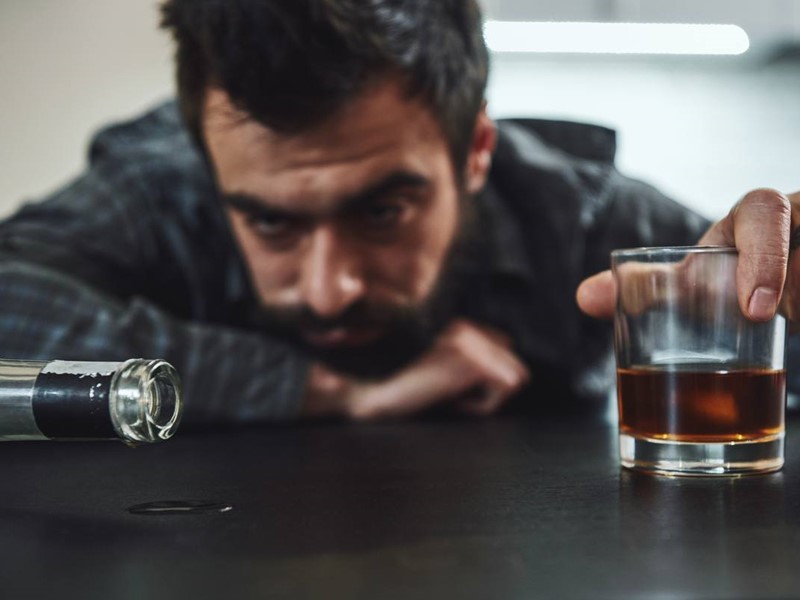Admission Line (866) 396-3655
Anxiety and Alcohol Addiction

Anxiety and alcohol addiction can often go hand-in-hand. Using alcohol to manage the symptoms of anxiety can make it worse. Here’s what you need to know about this co-occurring disorder.
What is Anxiety?
Anxiety is often referred to as the feeling of nervousness you get when you do something new. For instance, someone might feel anxious about having an interview for a new job. However, this type of anxiety is normal for everyone and differs from anxiety disorders. There are a number of anxiety disorders that can cause varied dangerous symptoms if left untreated.
Generalized anxiety is one of the most common anxiety disorders. Patients with generalized anxiety could feel high levels of stress daily. This often leads to irrational fears or the feeling of impending doom. Someone with this disorder may use alcohol to escape their own thoughts and fears.
Social anxiety disorder is another form of anxiety. Patients with this type of disorder become worried about being in social settings, particularly large groups. Agoraphobia can be an unpleasant result of this disorder, where patients become fearful of leaving their own homes. Some people with anxiety disorders may also suffer from panic disorders. This is where panic attacks occur as a result of feeling anxious.
What is Addiction?
Alcohol addiction is the most serious form of high risk drinking. Someone with an alcohol addiction may have an uncontrollable desire to drink alcohol which could result in harming their health. This could lead to the patient feeling like they cannot function without drinking alcohol.
Patients may also notice that they need to keep increasing the quantity of alcohol they drink to receive the same relief. Jobs and other responsibilities may take second place to alcohol, and heavy drinking can lead to a number of serious health problems.
Using Alcohol to Cope With Anxiety
There are many reasons why someone may turn to alcohol to help with symptoms of anxiety. Perhaps the person does not recognize their symptoms to know they need to seek help for anxiety. It could be that their doctor has refused to treat the anxiety with medication because they want to try alternative methods first.
In addition, if a person suffering from anxiety is offered medication, it’s usually CNS depressants called benzodiazepines. The relief this medication offers is similar to the relief from alcohol, so it’s not uncommon for anxiety sufferers to use alcohol even when they have been prescribed medication. Using alcohol to cope with anxiety may give initial relief, but the consequences of continuing to use alcohol as a coping mechanism can be dire.
Did you know that 32.3 percent of American adults reported symptoms of anxiety this year? One in five of those adults use alcohol as a coping mechanism and 20 percent of adults diagnosed with alcohol use disorder also have anxiety disorder or mood disorder.
Co-occurring Disorders
Alcohol addiction often comes with other co-occurring disorders. It could be that the patient used alcohol as a way of minimizing the symptoms of anxiety and became addicted to alcohol as a coping mechanism. However, it could also be that someone with an existing alcohol disorder started to feel symptoms of anxiety.
The effects of alcohol on the body and withdrawal symptoms of alcohol can lead to feelings of anxiety. Patients receiving treatment for alcohol disorder and anxiety disorder may have difficulty with remembering which came first. However, knowing which disorder leads to the other could help patients to address the issues more successfully.
Treatment Options
At Jackson House Rehab, there are a range of different treatment options for co-occurring disorders. With more than 14 million Americans suffering from alcohol addiction, it’s more important than ever for treatment to be accessible. If you’re finding it difficult to limit the amount you drink and you still drink when you feel physical pain, you may be addicted to alcohol. Our treatment programs are designed to help you get the best out of your future.
Detoxification
Detoxing from alcohol can be a grueling process that results in unpleasant physical symptoms. You may experience nausea, sickness, headaches, tremors, palpitations, and more. Our dedicated team will help you through this process and make sure you receive the care you need to detox successfully.
Therapy
Therapy is vital when learning to cope with co-occurring disorders. Our therapies include group therapy, evidence-based therapy, individual and family therapy, and addiction psychiatry. Your therapists will help you to identify root issues and work on developing healthy coping mechanisms. You’ll also get a chance to address any relationship issues that have arisen as a result of your addiction so you can move forward positively with your family members.
Aftercare
You’ll have around the clock support while you’re at Jackson House Rehab. We want you to be able to move forward with your life and succeed without addiction hanging over you. We also recognize that your recovery will extend past your time at our clinic. That’s why we want all our patients to remain part of our community so we can always be a helpful resource when needed. Our aftercare support group is always on hand when you need encouragement.
Whether you’re just having a bad day or you’re finding it difficult to maintain your recovery plan, we’ll be around to help keep you on track.
Starting Your Journey
Admitting you have a problem with alcohol is often the hardest step. If you need help in getting started on your journey to recovery, we’re here to help. Just a quick phone call and one of our dedicated specialists will be able to offer you advice and book you for a consultation. From there, we can create a personalized recovery plan and give you all the support you need to get healthy.
Contact us today to get started.
